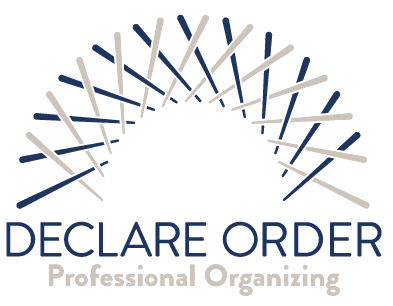Posted on: January 10, 2020
Where did the practice of making New Year’s Resolutions originate? According to history.com, resolutions are rooted in promises to god from ancient times. The stakes were considerably higher because people did not want to risk falling out of god’s favor.
In modern times, people are more likely to select goals that spur personal or business growth. These goals are self-directed. Without external motivation and accountability, however, these resolutions are less likely to succeed.
What goals did you set for yourself in the coming year? Whether you have formally declared specific goals or just have informal thoughts on the matter, there are good reasons they came to mind. So why do so many New Year’s Resolutions fall by the wayside as the year goes on?
Because I work with organizing clients all year round, I have first-hand experience with obstacles people face on the way to achieving their goals. Here are my top three so you can identify and avoid them:
- Goals are Too Vague
In order for goals to be achievable, they need to be definable. For example, “Get Organized” is a common New Year’s Resolution. But what does it really mean?
What does “getting organized” look like FOR YOU?
When I work with clients on organizing goals, my first task is to define the outcome. We break down goals into a series of interim steps. I work with the client to identify tasks by location and type of clutter.
Once the client and I know what category we are concentrating on, items are sorted – clothing, for example, by type – to determine which items should continue to “live” in the space. After eliminating excess, separating clothing deemed off-season, or off-size, and moving out non-clothing items, we can do the work of organizing what remains.
Rather than the vague, “Get Organized,” a specific, achievable resolution could be to “Establish and Maintain a Functional Organizing System for My Clothes in the Master Bedroom Closet.” This specific goal is easier to achieve than, “Get Organized,” and has a daily impact.
Added bonus – once a new organizing habit is formed, the success leads to momentum to establish and maintain organizing systems in other areas.
- You are “Too Busy”
In order for goals to push through your constant state of “busy” to be achievable, they need a deadlines or outside accountability. Perhaps you have a goal to “write a book” or “exercise more,” for example, and decide to make time to do so…
I know from personal experience when I used to work on my own writing goals, I approached them as a solitary activity. As a result, other things always popped up as priorities and I felt lousy about myself. (This can happen when you “join a gym” too.)
Between October 2019 and January 2020, I wrote two 50,000 word drafts for two books. I did it because I had accountability and deadlines created by members of my local writing group. I am now in the editing phase and can’t imagine doing it without their support. In addition, I contributed a short story and two poems to their most recent anthology! Are we mostly introverts? Yes. Is it terrifying to put your work in front of others for critique? Yes. But it is incredibly rewarding to receive positive feedback and support others in their endeavors as well. Even when I am “too busy” the group deadlines and camaraderie keep me on track and I am getting closer to my goal of publishing a book.
Deadlines and accountability also work for the vague goal of “exercise more.” Instead, consider framing the goal as:
- Enrolling in specific exercise classes at specific times
- Meeting a friend to walk on Tuesdays at 10am, or
- Following a training schedule to compete in a 5K on a specific date
- You Feel too Blue
The hard truth about why New Year’s Resolutions (or previous attempts at organizing) fail, is that people don’t like to make mistakes. They get down on themselves and this makes it harder to find the motivation to continue.
I am not a therapist, but I work with clients in intimate settings – literally right in the middle of the mess. While I do my best to assure them I am non-judgmental, they are often down on themselves about how the mess got there and their failure to hold themselves accountable to do something about it. While this is easily remedied by making a plan and getting started, there are times when I tactfully ask clients if they are currently in therapy or have considered seeing a therapist.
If you accept obstacles as part of the process of achieving your goals, you will find you are better able to push past the negative self-talk about achieving them!









Leave A Comment